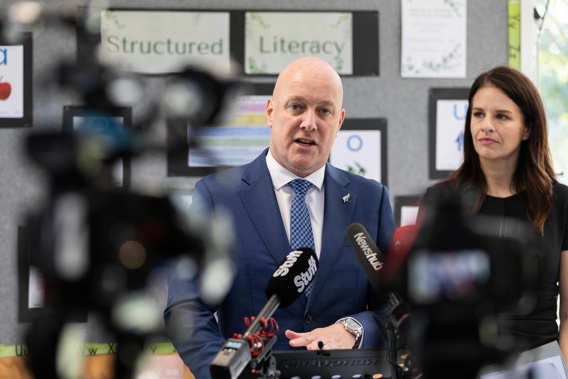
While a prominent teachers union has stressed the important role that parents play in improving the country's rapidly worsening school suspension and stand-down rate, the Government has other ideas - instead keen to focus its energies on teacher training.
New Education Ministry data shows around 22,000 stand downs last year, up from 18,600 in 2022, higher than pre-pandemic figures. It's the second blow to the country's education standards after last week's OECD report, which found disruptive classroom behaviour has worsened in the past two years.
PPTA president Chris Abercrombie told The Mike Hosking Breakfast this morning that schools will tend to stand down or suspend a student as a last resort - saying the action, which would be decided by a school's board, was quite a process.
He said the student suspension data was a symptom of the child behaviour issues that classrooms across New Zealand were facing.
"Unfortunately, it's often the only way to get extra support is to stand a kid down - and that will trigger certain things within the ministry and there's ready support available. So unfortunately it's the only way," he told Hosking.
When asked how parents fit into the equation, Abercrombie said that school is a community which would be the product of the family communities it was connected to.
"If there's issues in the community then there's going to be similar issues in the schools. And the schools reflect the community," said Abercrombie.
"So parents may play a key role in this. I mean, [the students] are only at school for six hours a day out of 24, so the other people they're with and the support the parents have of the school is absolutely vital."
Newstalk ZB Plus approached Minister of Education Erica Stanford about how much of a role the responsibility of parents and wider communities will play a part in child behaviour.
Stanford said the ERO report that the ministry received last week had a number of recommendations, including having a national approach to behaviour in schools.
"[This would mean] how behaviour is dealt with, and the expectations of behaviour are the same at every school and I'm following this up with the ministry," she told ZB Plus.

"My intention isn't to develop a one-size-fits-all approach, but to explore best-practice guidance, minimum expectations and the benefits of consistency for student and teacher outcomes."
She also said the report had recommended improved teacher education, which would help them feel better prepared to handle poor classroom behaviour that would lead down the track of students being suspended or stood down.
In this case, Stanford is focused on improving the quality of teacher training to tackle this issue.
"If teachers know the best techniques and strategies for managing behaviour in the classroom and playground and can apply these with consistency and then intervene early, we can reduce the number of stand-downs and suspensions."
Last week's OECD report found that disruptive behaviour has become worse over the past two years and a quarter of principals said they're seeing students hurt others and steal property at least every day.
The head of the Education Evaluation Centre, Ruth Shinoda, told Newstalk ZB that the report had made for “depressing reading”, and wanted any government cracking down on learning disruption to focus on three key areas.
The first area was a "national approach" to managing school support and making sure that schools can access the same support and are "really backed to succeed".
"The second is we do need to support our kids, so let's have greater prevention and let's set them up to succeed at school.
"And lastly, let's really help these teachers with the expert support and skills they need. And yes, we do think taking cellphones out of classrooms will help."
Take your Radio, Podcasts and Music with you







